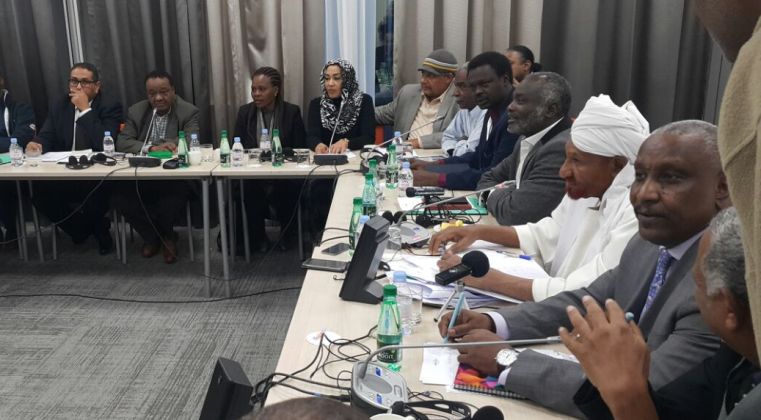Sudan Call urges inclusion of democratic demands to requirements for lift of sanctions

January 21, 2017 (PARIS) – Sudan’s opposition umbrella Sudan Call said it asked the U.S. Administration to include additional items serving interests of the Sudanese to its list of demands from Khartoum to lift the sanctions imposed on Sudan fully.
Last week, former U.S. President Barack Obama signed an executive order to ease sanctions against Sudan enabling trade and investment transactions to resume with the east African nation.
He said the move was intended to acknowledge Sudan’s efforts to reduce internal conflicts, improve humanitarian access to people in need and curtail terrorism.
Speaking at a press conference following the end of the Sudan Call Leadership Council meetings in Paris on Friday, Sudan Call leaders downplayed the ease of sanctions, saying it is mere “general licenses” that would keep Khartoum in a six-month monitoring period before the sanctions could be lifted fully.
Leader of the National Umma Party (NUP) al-Sadiq al-Mahdi said the Sudan Call saw that Washington’s decision should have been clearly linked to peace and democratic standards and the humanitarian issues besides the resolution of internal conflicts in order to serve interests of the Sudanese.
He stressed that the opposition alliance has contacted the relevant parties to ensure that the monitoring period must be linked to addressing major issues including the comprehensive peace, democratic transformation and the humanitarian problem.
Al-Mahdi pointed that Washington continued to support peace and democratic transformation in Sudan, saying however it didn’t consult with the opposition in the recent decision.
“But they are aware of our demands and they said the monitoring period would take into account the political development, human rights and internal differences in Sudan,” he said.
The veteran leader added that each country has its policy priorities, saying Washington’s top priority is to ensure U.S. security particularly with regard to Khartoum’s negative roles in South Sudan and Libya and elsewhere.
He pointed that Washington has likely received assurances from Khartoum to abandon these negative actions, saying the Sudanese government agreed to engage in the fight against terrorism according to the U.S. terms.
For his part, Secretary General of the Sudan People’s Liberation Movement/North (SPLM-N) Yasser Arman said the Sudanese wouldn’t benefit from the lift of sanctions without the implementation of the good governance, democracy and accountability, pointing the Sudanese regime is running a “war state”.
He said the ease of sanctions on Sudan was contingent upon certain conditions, stressing the Sudanese regime continues to support terrorism and is still under monitoring from the U.S.
“The regime won’t reconcile with the international community unless it reconciles with the Sudanese people first … the crisis is mainly domestic and has international implications and Europe wouldn’t support Sudan until it ends the IDPs and refugee crisis,” he said.
On the other hand, leader of the Justice and Equality Movement (JEM) pointed to ongoing contacts with the U.S. Administration and the international community to ensure that issues of freedoms, human rights and political development are among the demands for the complete lift of sanctions imposed on Sudan.
He disclosed that the U.S. Envoy Donald Booth told them on 20 August that Washington is about to lift sanctions imposed on Khartoum, saying they asked him to include issues of peace and democratic transformation to the agenda of talks with Khartoum.
Ibrahim acknowledged that the opposition can’t take part in the monitoring process or the mechanisms that decide on the lift of sanctions, saying it will seek to include its standards among the requirements for the lift of sanctions.
He stressed that change in Sudan is contingent on domestic variables and has nothing to do with the U.S. lineup with the regime.
Meanwhile, the al-Mahdi said the Leadership Council has agreed to his return to Sudan on 26 January, pointing that media reports about differences among the opposition alliance regarding his return are nothing but “rumors, nonsense and illusions”.
For their part, Arman and Ibrahim announced support for al-Mahdi’s return to Khartoum, urging their affiliates to participate in the reception of the NUP leader.
Also, the final communiqué of the Leadership Council meeting has condemned the arrest campaign against opposition leaders and activists, demanding their immediate release.
It stressed that efforts are underway to establish a unified centre for the opposition forces.
The Sudan Call, which was established in Addis Ababa on 3 December 2014, includes the NUP and rebel umbrella of Sudanese Revolutionary Front (SRF), and the Civil Society Initiative (CSI).
Sudan Call internal groups include the Sudanese Congress Party (SCoP), Sudanese Baath Party (SBP), Center Alliance Party (CAP), Sudanese National Party (SNP) and Sudanese National Alliance (SNA).
(ST)
